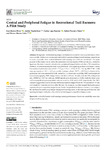Central and peripheral fatigue in recreational trail runners: A pilot study

Use este enlace para citar
http://hdl.handle.net/2183/32753Coleccións
- Investigación (CCDEF) [299]
Metadatos
Mostrar o rexistro completo do ítemTítulo
Central and peripheral fatigue in recreational trail runners: A pilot studyAutor(es)
Data
2023Cita bibliográfica
Muñoz-Pérez, I.; Varela-Sanz, A.; Lago-Fuentes, C.; Navarro-Patón, R.; Mecías-Calvo, M. Central and Peripheral Fatigue in Recreational Trail Runners: A Pilot Study. Int. J. Environ. Res. Public Health 2023, 20, 402. https:// doi.org/10.3390/ijerph20010402
Resumo
[Abstract]: Background: Understanding fatigue mechanisms is crucial for exercise performance. However,
scientific evidence on non-invasive methods for assessing fatigue in trail running competitions
is scarce, especially when vertical kilometer trail running races (VK) are considered. The main
purpose of this study was to assess the autonomic nervous system (ANS) activity (i.e., central fatigue)
and the state of muscle activation (i.e., peripheral fatigue) before and after a VK competition.
Methods: A cross-sectional pilot study was performed. After applying inclusion/exclusion criteria,
8 recreational male trail runners (31.63 7.21 yrs, 1.75 m 0.05 m, 70.38 5.41 kg, BMI: 22.88 0.48,
running experience: 8.0 3.63 yrs, weekly training volume: 58.75 10.35 km) volunteered to
participate and were assessed for both central (i.e., via heart rate variability, HRV) and peripheral
(via tensiomyography, TMG) fatigue before and after a VK race. Results: After the VK, resting heart
rate, RMSSD (p = 0.01 for both) and SDNN significantly decreased (p = 0.02), while the stress score
and the sympathetic-parasympathetic ratio increased (p = 0.01 and p = 0.02, respectively). The TMG
analyses suggest that runners already suffered peripheral fatigue before the VK and that 20–30 min
are enough for muscular recovery after the race. In summary, our data suggest that participants
experienced a pre-competition fatigue status. Further longitudinal studies are necessary to investigate
the mechanisms underlying fatigue during trail running races, while training periodization and
tapering strategies could play a key role for minimizing pre-competition fatigue status.
Palabras chave
Vertical kilometer
Trail running
Running performance
Heart rate variability
Muscular fatigue
Tensiomyography
Trail running
Running performance
Heart rate variability
Muscular fatigue
Tensiomyography
Versión do editor
Dereitos
Atribución 3.0 España
ISSN
1660-4601






